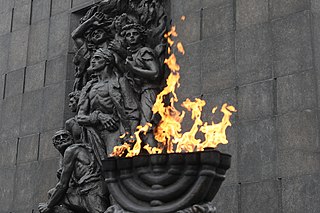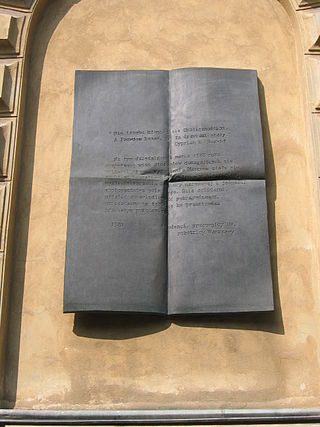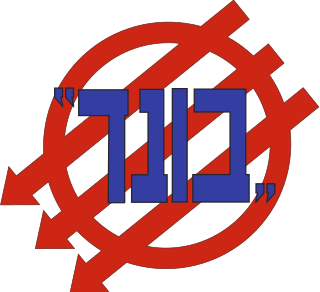The interwar Communist Party of Poland was a communist party active in Poland during the Second Polish Republic. It resulted from a December 1918 merger of the Social Democracy of the Kingdom of Poland and Lithuania (SDKPiL) and the Polish Socialist Party – Left into the Communist Workers' Party of Poland. The communists were a small force in Polish politics.

National Armed Forces was a Polish right-wing underground military organization of the National Democracy operating from 1942. During World War II, NSZ troops fought against Nazi Germany and communist partisans. There were also cases of fights with the Home Army.

The history of the Jews in Poland dates back at least 1,000 years. For centuries, Poland was home to the largest and most significant Ashkenazi Jewish community in the world. Poland was a principal center of Jewish culture, because of the long period of statutory religious tolerance and social autonomy which ended after the Partitions of Poland in the 18th century. During World War II there was a nearly complete genocidal destruction of the Polish Jewish community by Nazi Germany and its collaborators of various nationalities, during the German occupation of Poland between 1939 and 1945, called the Holocaust. Since the fall of communism in Poland, there has been a renewed interest in Jewish culture, featuring an annual Jewish Culture Festival, new study programs at Polish secondary schools and universities, and the opening of Warsaw's Museum of the History of Polish Jews.
Jędrzej Giertych was a Polish right-wing politician, journalist and writer.

The history of Poland from 1945 to 1989 spans the period of Marxist–Leninist regime in Poland after the end of World War II. These years, while featuring general industrialization, urbanization and many improvements in the standard of living, were marred by early Stalinist repressions, social unrest, political strife and severe economic difficulties. Near the end of World War II, the advancing Soviet Red Army, along with the Polish Armed Forces in the East, pushed out the Nazi German forces from occupied Poland. In February 1945, the Yalta Conference sanctioned the formation of a provisional government of Poland from a compromise coalition, until postwar elections. Joseph Stalin, the leader of the Soviet Union, manipulated the implementation of that ruling. A practically communist-controlled Provisional Government of National Unity was formed in Warsaw by ignoring the Polish government-in-exile based in London since 1940.

Marek Edelman was a Polish political and social activist and cardiologist. Edelman was the last surviving leader of the Warsaw Ghetto Uprising. Long before his death, he was the last one to stay in the Polish People's Republic despite harassment by the Communist authorities.

Antoni Macierewicz is a Polish politician and the former Minister of National Defence. He previously served as the Minister of Internal Affairs, Head of the Military Counterintelligence Service, and Minister of State in the Ministry of National Defence.
Following the establishment of the Second Polish Republic after World War I and during the interwar period, the number of Jews in the country grew rapidly. According to the Polish national census of 1921, there were 2,845,364 Jews living in the Second Polish Republic; by late 1938 that number had grown by over 16 percent, to approximately 3,310,000, mainly through migration from Ukraine and the Soviet Russia. The average rate of permanent settlement was about 30,000 per annum. At the same time, every year around 100,000 Jews were passing through Poland in unofficial emigration overseas. Between the end of the Polish–Soviet War of 1919 and late 1938, the Jewish population of the Republic grew by nearly half a million, or over 464,000 persons. Jews preferred to live in the relatively-tolerant Poland rather than in the Soviet Union and continued to integrate, marry into Polish Gentile families, to bring them into their community through marriage, feel Polish and form an important part of Polish society. Between 1933 and 1938, around 25,000 German Jews fled Nazi Germany to sanctuary in Poland.

The Polish 1968 political crisis, also known in Poland as March 1968, Students' March, or March events, was a series of major student, intellectual and other protests against the ruling Polish United Workers' Party of the Polish People's Republic. The crisis led to the suppression of student strikes by security forces in all major academic centres across the country and the subsequent repression of the Polish dissident movement. It was also accompanied by mass emigration following an antisemitic campaign waged by the minister of internal affairs, General Mieczysław Moczar, with the approval of First Secretary Władysław Gomułka of the Polish United Workers' Party (PZPR). The protests overlapped with the events of the Prague Spring in neighboring Czechoslovakia – raising new hopes of democratic reforms among the intelligentsia. The Czechoslovak unrest culminated in the Warsaw Pact invasion of Czechoslovakia on 20 August 1968.
Żydokomuna is an anti-communist and antisemitic canard, or a pejorative stereotype, suggesting that most Jews collaborated with the Soviet Union in importing communism into Poland, or that there was an exclusively Jewish conspiracy to do so. A Polish language term for "Jewish Bolshevism", or more literally "Jewish communism", Żydokomuna is related to the "Jewish world conspiracy" myth.

In Poland, the resistance movement during World War II was led by the Home Army. The Polish resistance is notable among others for disrupting German supply lines to the Eastern Front, and providing intelligence reports to the British intelligence agencies. It was a part of the Polish Underground State.

Roman Zambrowski was a Polish communist politician.

The National Radical Camp was an ultranationalist and antisemitic political movement which existed in the pre-World War II Second Polish Republic, and an illegal Polish anti-communist, and nationalist political party formed on 14 April 1934 mostly by the youth radicals who left the National Party of the National Democracy movement.

Józef Różański was an officer in the Soviet NKVD and later, a Colonel in the Polish Ministry of Public Security (UB), the communist secret police. Born into a Polish-Jewish family in Warsaw, Różański became very active in the Communist Party of Poland before World War II. He joined the NKVD following the Soviet invasion of Poland and after the war, adopting the name Różański, served as an agent with the Polish Communist Security apparatus.

Kazimierz Dejmek was a Polish actor, theatre and film director, and politician. During his career he managed the New Theatre in Łódź, the National Theatre, Warsaw, and the Teatr Polski, Warsaw. From 1993 to 1996 he served as Poland's Minister of Culture. In 1984 Dejmek was awarded the Witkacy Prize - Critics' Circle Award and in 1989 the Grand Cross of the Order of Polonia Restituta, one of his country's highest honours.

The General Jewish Labour Bund in Poland was a Jewish socialist party in Poland which promoted the political, cultural and social autonomy of Jewish workers, sought to combat antisemitism and was generally opposed to Zionism.

Artur Eisenbach was a Polish-Jewish historian; an expert on the history of Jews in Poland, member of Polish Academy of Sciences and the head of the Jewish Historical Institute in Warsaw between 1966 and 1968.

Poale Zion was a movement of Marxist–Zionist Jewish workers founded in various cities of Poland, Europe and the Russian Empire at about the turn of the 20th century after the Bund rejected Zionism in 1901.

The General Jewish Labour Bund in Lithuania, Poland and Russia, generally called The Bund or the Jewish Labour Bund, was a secular Jewish socialist party initially formed in the Russian Empire and active between 1897 and 1920. In 1917 the Bund organizations in Poland seceded from the Russian Bund and created a new Polish General Jewish Labour Bund which continued to operate in Poland in the years between the two world wars. The majority faction of the Russian Bund was dissolved in 1921 and incorporated into the Communist Party. Other remnants of the Bund endured in various countries. A member of the Bund was called a Bundist.

The Puławians, or the Puławy faction, as they came to be informally dubbed, comprised one of two principal communist groupings in Stalinist Poland which – in the spring of 1956, following the death of Bolesław Bierut – vied for power within the leadership of the Polish United Workers' Party. The Puławians were known, during Poland's destalinization process, as reformists.
















